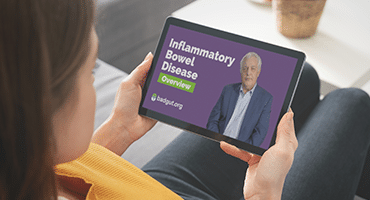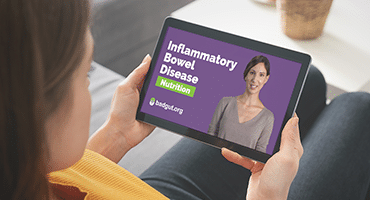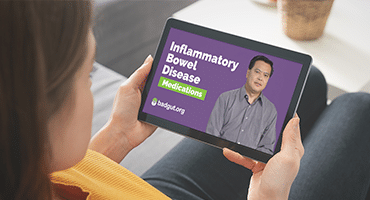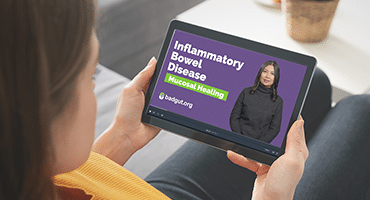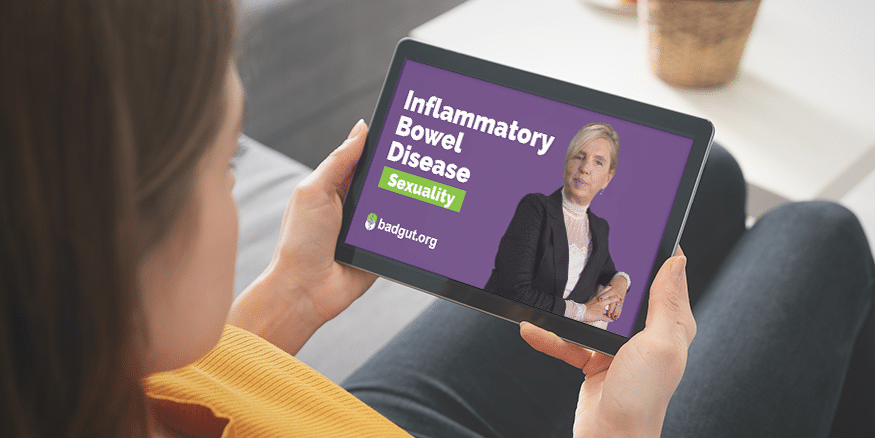
Sexuality and IBD (Crohn’s and Colitis) Video
Featuring
Maureen McGrath
Registered Nurse and Nurse Continence Advisor
Sexual Health Educator
Author of Sex & Health
maureenmcgrath.com
Video Transcript
As a registered nurse and sexual health educator, I am familiar with the association between sexuality and overall physical and emotional health. In fact, I authored a book called Sex and Health, Why One Can’t Come Without the Other.
Your health is your wealth. When a disease threatens your health, it affects your quality of life and your sexual health.
This is true for Crohn’s disease and ulcerative colitis, two of the most common inflammatory bowel diseases, or IBDs. These are chronic conditions that can affect both physical and mental health.
IBD causes inflammation in the gastrointestinal tract and, particularly in the case of Crohn’s disease, can disrupt your body’s ability to digest food, absorb nutrients, and normal elimination of waste products. IBD can result in diarrhea, significant pelvic and abdominal pain, and unintended weight loss. Other expressions of IBD include arthritis, skin problems, liver disease, kidney stones, and eye inflammation. These symptoms can affect your sexual health.
Sexuality involves your sexual feelings and thoughts, as well as finding other people physically, sexually, or emotionally attractive. We are sexual beings and sex is an important part of life. Despite this, sex remains taboo, and many falsely believe that individuals with chronic health conditions aren’t sexual. Having a disease does not eliminate sexual desire and interest, in fact, those living with IBD rate sexual functioning and body image highly among concerns affecting their quality of life.
Both men and women fear that some of the symptoms of IBD will reduce their sex drive, interfere with intercourse, compromise their sexual performance, affect their attractiveness, negatively affect intimacy and relationship quality, and cause negative feelings about their physical appearance. For example, it’s a challenge to feel sexy when you’re regularly sitting on a toilet due to frequent, painful diarrhea, and you might not feel ‘up to it’ if you’re suffering from fatigue.
If you have IBD, you might experience changes to your appearance, involving weight loss or gain, hair loss, or skin manifestations, either from the disease itself or from medications used to treat it. If you’re living with IBD you can be sexually active but you might need a bit more focus on finding the right partner. First you should address your own sexual self-esteem and any body image issues, as these might get in the way of a fulfilling sex life.
If you have a partner already, take the time to share how you feel both physically and emotionally, as these are important parts of a healthy relationship. If you are feeling particularly unwell, by expressing this, your partner will know to give you space, or suggest cuddle time without more intimate contact. It is important for your partner to see you as the person you are, not as the disease you’re living with.
If you’re dating, you might need to take a bit of extra time discerning whether the other person is truly kind and understanding, by sharing your condition gradually over time. This way, you’ll be able to build a relationship with someone who cares about you and who will accommodate any issues. You might be surprised to learn how many genuine, caring individuals are out there who are willing to love you for who you are.
Negative body image is associated with depressive symptoms, low self-esteem, mental and emotional health, disordered eating, and other forms of poor self-care. It is also related to decreased sexual satisfaction and impairments in interpersonal relationships.
A recent study found that body image dissatisfaction remained stable, even when disease activity improved, and was associated with lower health related quality of life. The more disease-related symptoms a person had, the less they were satisfied with their body image.
In this study, female participants had more disease activity, a higher symptom burden, and a longer duration of steroid use compared to the male participants. Females also suffered from more skin irritations. Overall, women had greater body image dissatisfaction. Interestingly, both males and females who were living with ileocolonic Crohn’s disease had greater body image dissatisfaction as well.
You might be wondering why this is important to sexual health. Body image dissatisfaction places you at risk for depression and low self-esteem, and can affect your relationships, especially your vulnerability, openness to be in a relationship, general wellness, and fatigue. It can cause shame and anxiety, preoccupation with your weight, shape, or appearance, and feelings that your body is flawed compared to others.
Sexual desire is complex, especially for women who tend to experience higher rates of body image dissatisfaction. But men suffer as well and for most of the same reasons, including fatigue, stress, unresolved conflict, depression, and pain. IBD in men can also cause erectile dysfunction and premature ejaculation. If you’re suffering from these conditions, its best to consult a healthcare professional.
Self-care is critical to healthy sexuality. If the symptoms and experiences of living with IBD are making it difficult for you to enjoy sex, then working on your self-care can help you feel better and improve your sex life. Self-care includes managing anxiety using a range of healthy strategies such as meditation, talk therapy, and medication if needed.
You may also want to sweat it out. Exercise boosts immunity, reduces inflammation, lowers stress, and will help you sleep well each night, which is another important aspect of self-care. However, we know that if you’re living with IBD and your energy is low, then you might only be able to do this in moderation.
Nutrition is important, especially when you have a digestive disease, so try to focus on eating foods that are nutritious and make you feel good.
Having IBD does not mean you have to neglect your sexy side; it’s time to get into the new you. Go out or go online and purchase some clothes that make you look and feel great. If you are into lingerie, there are a wide variety of styles to choose from today that are flattering and will help to disguise a stoma or an appliance, if you have an ostomy.
Sex is a vital aspect of living, loving, and overall wellbeing. It has physical and mental benefits that last beyond the moment, including a reduced risk of heart disease, strengthened immune function, better sleep, and improved self-esteem.
Healthy living, combined with the treatment regimen prescribed by your gastroenterologist, will help you feel well and build your confidence. You are more than the disease you’re living with. You are a sexual being first and deserve a loving relationship and more than a hot gut. You deserve hot sex!

